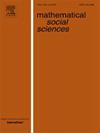同性婚姻,伟大的均衡器
IF 0.7
4区 经济学
Q4 ECONOMICS
引用次数: 0
摘要
在纳什议价的搜索与匹配模型中,我们发现了无限多的不对称均衡,其中一方的收益低于另一方的收益。这种机制类似于一种社会规范:如果婚姻市场对面的所有代理人都变得更加苛刻,那么继续寻找的回报就会减少。然而,如果同性婚姻合法化,并且市场的每一方都包括一个正的、任意小的双性恋代理人份额,那么只有对称均衡存在。这一结果凸显了对同性婚姻的限制如何加剧了异性配对的不对称。本文章由计算机程序翻译,如有差异,请以英文原文为准。
Same-sex marriage, the great equalizer
In a search and matching model with Nash bargaining, we find infinitely many asymmetric equilibria in which one sex receives a lower payoff than a similarly productive agent of the opposite sex. The mechanism resembles a social norm: if all agents on the opposite side of the marriage market become more demanding, continued searching yields diminished returns. However, if same-sex marriage is legalized and each side of the market includes a positive, arbitrarily small, share of bisexual agents, then only symmetric equilibria survive. This result highlights how restrictions on same-sex marriage reinforce asymmetries in opposite-sex matchings.
求助全文
通过发布文献求助,成功后即可免费获取论文全文。
去求助
来源期刊

Mathematical Social Sciences
数学-数学跨学科应用
CiteScore
1.30
自引率
0.00%
发文量
55
审稿时长
59 days
期刊介绍:
The international, interdisciplinary journal Mathematical Social Sciences publishes original research articles, survey papers, short notes and book reviews. The journal emphasizes the unity of mathematical modelling in economics, psychology, political sciences, sociology and other social sciences.
Topics of particular interest include the fundamental aspects of choice, information, and preferences (decision science) and of interaction (game theory and economic theory), the measurement of utility, welfare and inequality, the formal theories of justice and implementation, voting rules, cooperative games, fair division, cost allocation, bargaining, matching, social networks, and evolutionary and other dynamics models.
Papers published by the journal are mathematically rigorous but no bounds, from above or from below, limits their technical level. All mathematical techniques may be used. The articles should be self-contained and readable by social scientists trained in mathematics.
 求助内容:
求助内容: 应助结果提醒方式:
应助结果提醒方式:


